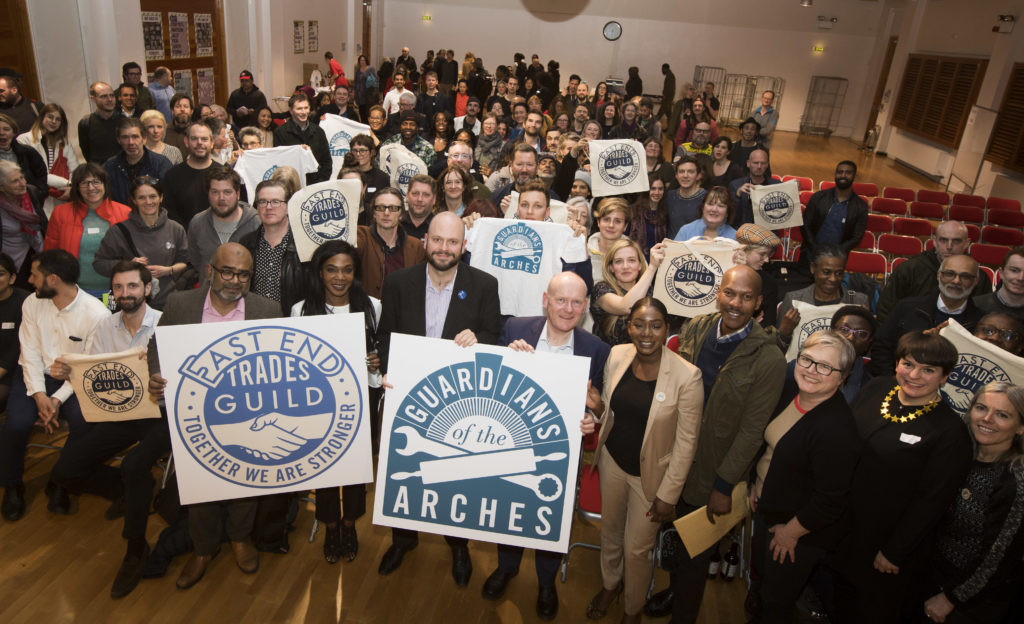This manifesto is a working draft and will be updated in collaboration with our members and partners. We invite you to engage with our working suggestions below and share your experience by emailing: manifesto@guardiansofthearches.org.uk

The people
The East End Trades Guild and Guardians of the Arches bring small businesses and the self-employed together to speak as one. Pursuing innovation and positive change for local independent enterprises and their neighbourhoods through member-led Community Organising. This approach is what distinguishes us from other business groups and is why our work is vital at this pivotal moment in history.
The common issue that has long-bound our diverse membership together is a commercial property market stacked against small and independent business owners. We have campaigned for fair, transparent rents and a level playing field for almost a decade.
In response to Covid-19 and the economic lock-down, we have drawn up a Manifesto for Economic Resilience suggesting strategic measures that address both the immediate survival of small businesses and future sustainability. This is backed by recent and on-going quantitative and qualitative research of our 600+ members to understand what they need to restart their businesses and return to sustainable trading and inclusive growth as well research by the New Economics Foundation and Queen Mary University of London.
Firstly, the government and commercial landlords must act to ensure small businesses can unfurlough staff and commence paying wages again, ahead of efforts to claw back lost rent or make new rent demands. Secondly, regional and local governments must act to bring in an affordable and fair rental framework, based on the research we have carried out over the last three years to ensure the long-term economic resilience of our communities.
Based on our most recent and ongoing consultations to ensure survival now we suggest the following proposals.
Rent
- 100% rent-free period for 6 months, back-dated, from March for all small and micro enterprises tenants severely affected by lockdown
- As businesses reopen, a rolling monthly rent-free, rent reduction or rent deferral provision based on affordability determined by real-time trading conditions
- Extend eviction protection under Coronavirus Act 2020 until December 2020, including those under temporary tenancy arrangements.
- Declare a moratorium on all not-yet-finalised rent reviews until the pandemic is over
Financial support
- Expand business support to include SMEs wholly or mainly reliant upon the retail, hospitality and leisure industries including small manufacturers, light industry, market traders and shared workspace
- Establish a transparent process for appeal for grants and rates relief and application for financial support for businesses affected by data inaccuracies
- Financially support Councils’ use of Hardship Funds for affected businesses currently ineligible for any support including self-employed and owner-directors
- Establish a London weighting for business support thresholds that reflects the higher rateable values
- To build future economic resilience a rebalancing of the property market
- Legislate for and implement a Working Rent system based on security of tenure, transparency and affordable rents.
- Social value-linked rent reductions
- Transparent rent registers for all commercial properties
- Legislate against upward only rent reviews and back-dated rental valuations
- Establish a public register of vacant commercial property to encourage productive use
- Compulsory Sales Orders, where there is a need for land or empty buildings owned by Overseas Landowners, to be brought into productive use
- Community Land Banks based on the US model to allow public or community-owned entities to acquire, repurpose, manage and maintain vacant and abandoned properties to meet local need.
Long term economic resilience
- Investigate the role of a Minimum Income Guarantee in rebuilding and creating economic resilience
- Create a local business support fund mechanism for small, social and community businesses to ensure ongoing resilience.
Covid-19 and the economic lockdown have highlighted the vital social, cultural and economic role small enterprises play in their immediate communities, wider economy and health of the nation. The various government emergency measures announced so far show the government understands this. However, without bold action to tackle some of the fundamental imbalances in the commercial property market, the efforts of government, enterprise support and business owners themselves to survive will be undermined. Bold action now is needed to ensure their survival and future economic resilience.
Background
In recent years dramatic rent rises have squeezed out independent businesses across London and the cities across the UK, threatening the critical diversity of our city’s economic ecosystem. Smaller enterprises are essential to a vibrant and healthy local economy and society. They provide 60% of all employment and sustain a distinctive identity that is the defining dimension of London’s cultural heritage.
Our research shows rapid rent rises are one of the key reasons small enterprises cannot create new jobs or increase salaries of hardworking employees. Unaffordable rents hurt the broader economy – not just the commercial tenants who pay them. The domino effect of each individual member’s inability to trade has implications for so many. What happens to these businesses and the real people and families during and after lockdown? It’s clear that we urgently need radical change if we are to ensure the longevity of a healthy mix of businesses that our Cities deserve, visitors pursue and which is essential for the survival of our communities.
Since 2012, we have used our collective voice and research to create a seat at the table for small, independent businesses with local Councils, Transport for London, The Arch Co, Blackstone, Telereal Trillium and the Greater London Authority. We have shown it is possible to co-produce the policies of large landlords together with community-based small businesses. In this time of crisis, we must bring unlikely and diverse stakeholders together from across the nation to find common ground and tackle the huge issues facing our economy and society now, before it is too late.